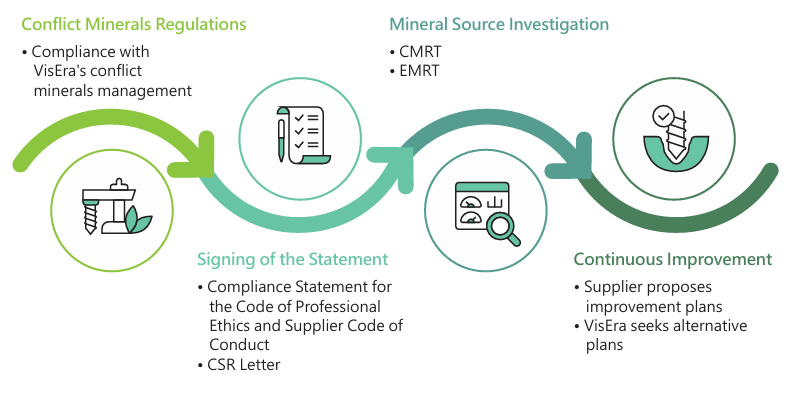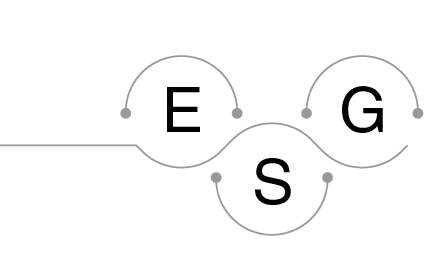4.4.1 Supply Chain Management
VisEra regards suppliers as the most important strategic partners. In addition to providing products that meet customer expectations, we invite suppliers to jointly fulfill corporate social responsibility while supporting environmental protection and social values. VisEra's suppliers for seven major procurement categories include raw materials, equipment and components, plant operation and engineering, outsourced service providers, waste disposal, service providers, and products. There were 527 suppliers in transactions in 2023. We identify tier 1 suppliers and key suppliers based on the procurement amount and the importance of the products and implement corresponding management measures to reduce supplier risks.
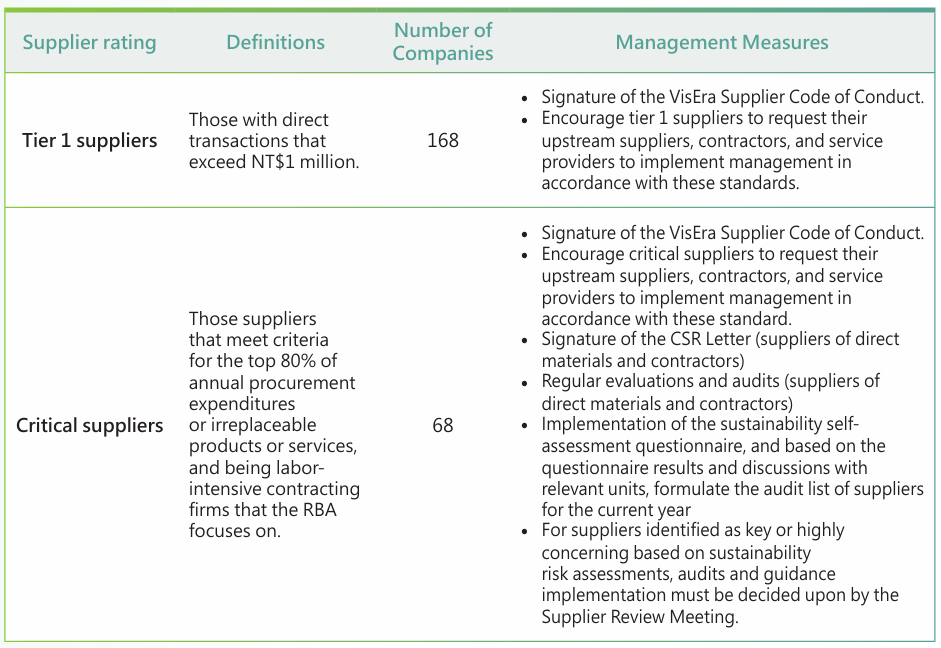
Convene two material preparation meetings each week for key materials such as photoresists and target materials, and implement continuous review of the quantity of raw material inventory with related personnel based on the customer demand volume. Photoresist materials generally involved joint development and there is only one supplier. To mitigate the material supply interruption risks, we ensure that the suppliers have backup plants. We maintain at least two main suppliers with backup plants for each target material. There has not been any shortage in supplies or interruptions that impacted production at the Company in the last three years or in the most recent period. Direct materials of VisEra are coated on products and do not need to be recycled. Therefore, there are no investments or plans for technologies for recycling materials. Other raw materials such as tetramethylammonium hydroxide (TMAH), isopropyl alcohol (IPA), and solvents are disposed as waste or recycled according to waste management practices after use.
In terms of the management structure, the Materials and Resources Department is the unit responsible for managing the supply chain. It convenes regular communication meetings every year to coordinate with all units on the implementation of strategies and targets involving suppliers' environmental protection, friendly workplace, supplier management, quality management and value innovation. To enhance improvements and achieve sustainable management in environmental, social and economic aspects, VisEra established the Supplier Review Board (SRB) in the second quarter of 2022. As a principle, it holds supplier review meetings every two weeks to rule on the invalidation of new suppliers or existing suppliers for the purpose of improving supplier management.
Inable supply chain that supports environmental protection, labor human rights, safety, and social responsibility through the four major strategies including new supplier assessment, supplier evaluation, continuous improvement management, and supplier communication platform.
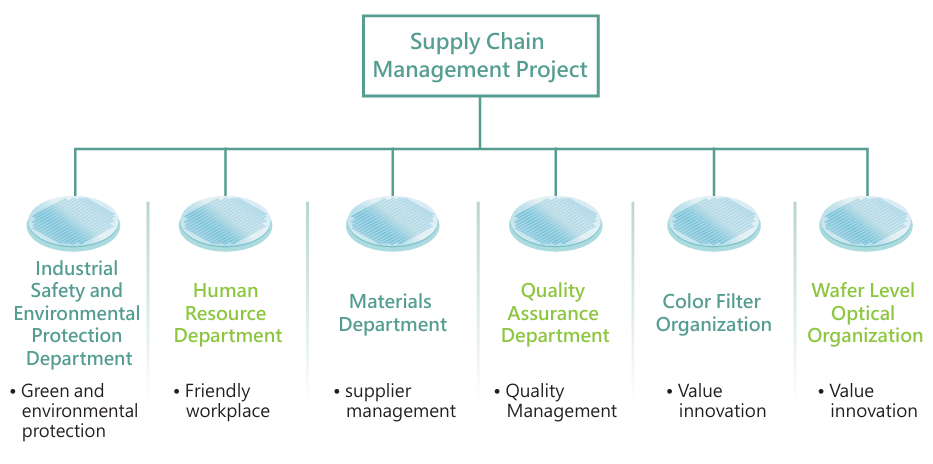
Supplier Management Item
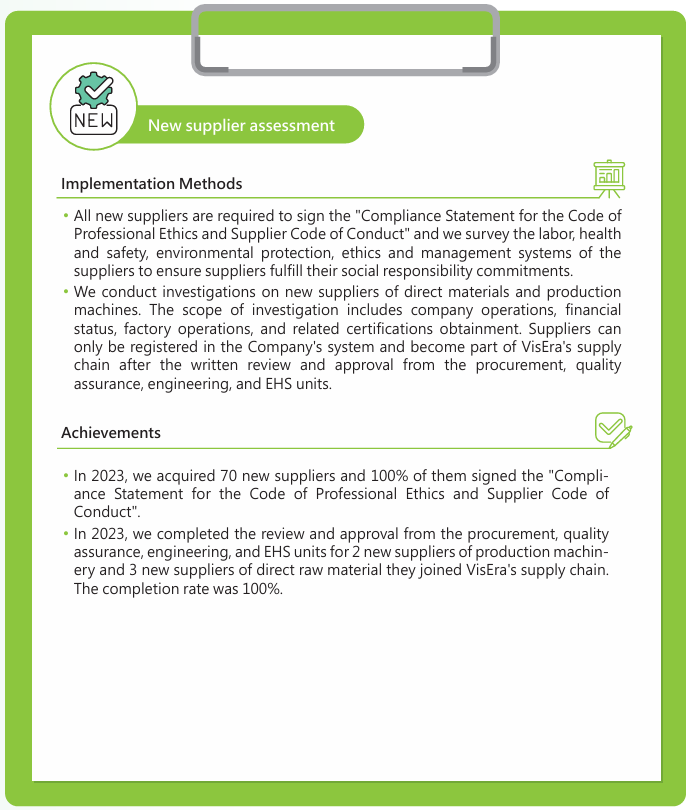
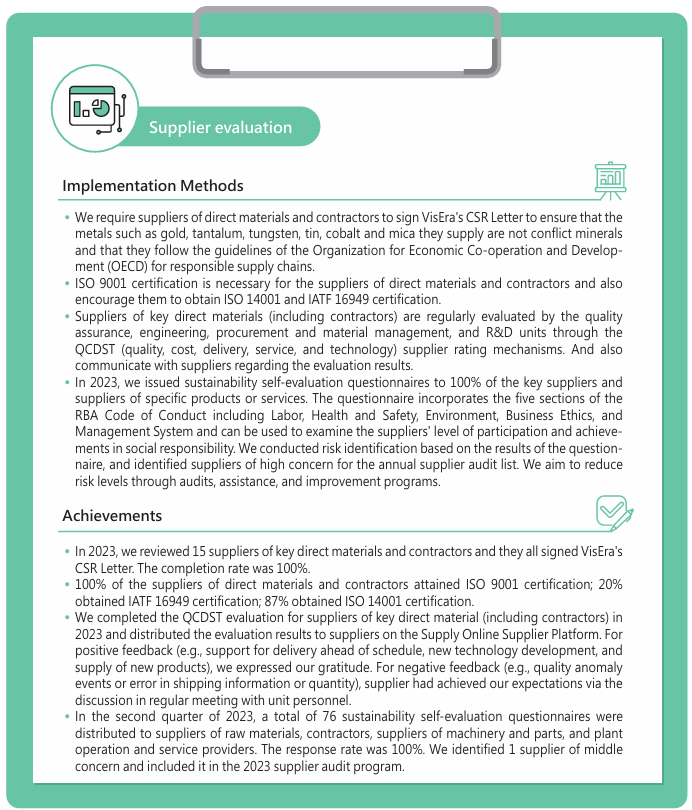
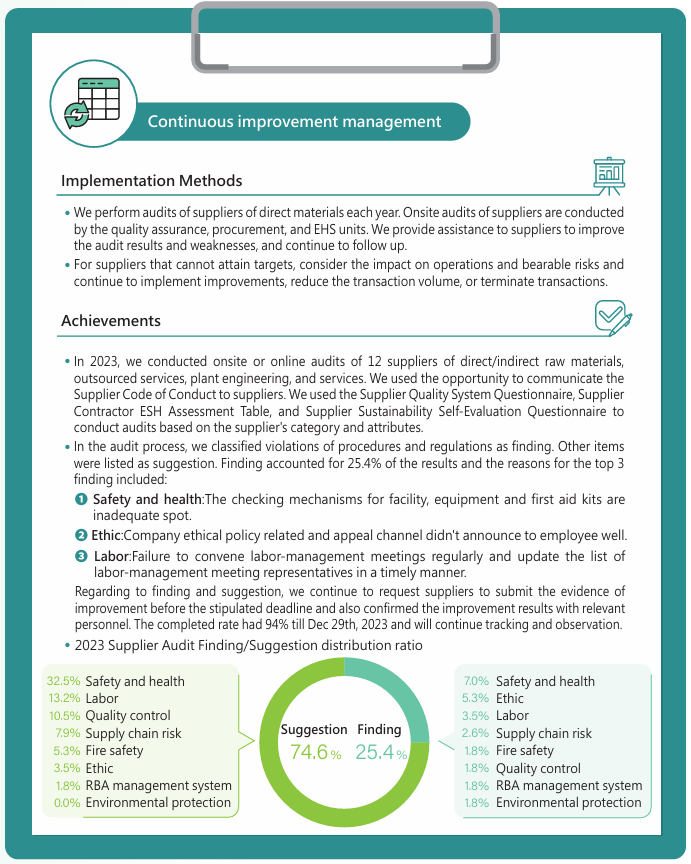
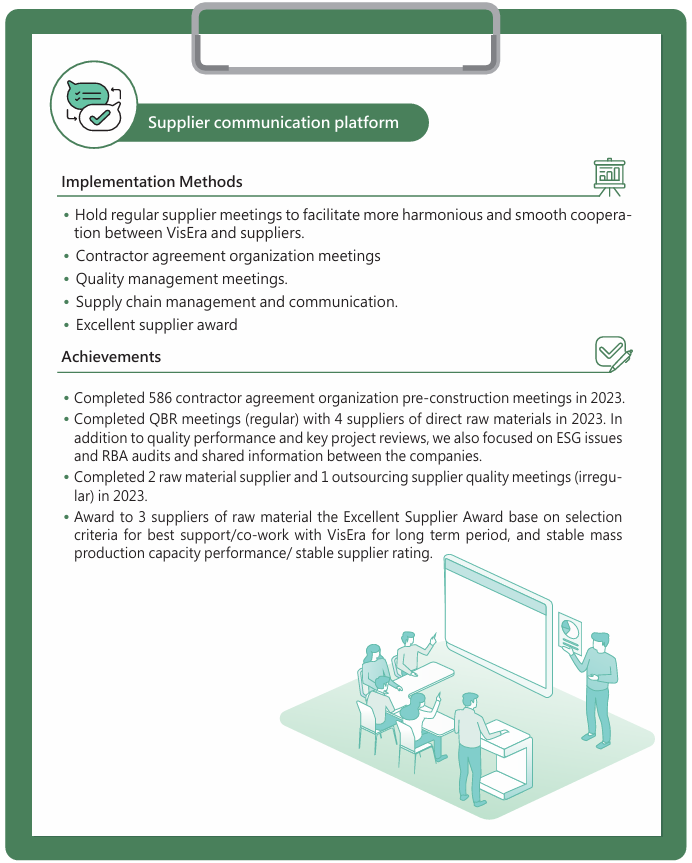
4.1.2 Supply Chain Sustainability Management
To ensure safety in the work environment of the supply chain, ensure that employees and their dignity are respected, and ensure that business operations support environmental protection and ethical practices, VisEra has established the "Compliance Statement for the Code of Professional Ethics and Supplier Code of Conduct" based on the Responsible Business Alliance (RBA) (formerly EICC) Code of Conduct and reference guidelines in the UN Guiding Principles on Business and Human Rights (the UN Guiding Principles) and other internationally recognized human rights regulations including the ILO Declaration on Fundamental Principles and Rights at Work and the UN Universal Declaration of Human Rights. It requires suppliers to meet the stated sustainability standards for labor, health and safety, environmental protection, and integrity.
We required the 70 suppliers added in 2023 to sign the Supplier Code of Conduct. The signature rate was 100%.
- VisEra Supplier Code of Conduct
Spotlight
VisEra issued sustainability self-evaluation questionnaires to key suppliers in 2023 to create a responsible supply chain and maximize our sustainability influence. The questionnaire incorporates the five sections of the RBA Code of Conduct including Labor, Health and Safety, Environment, Business Ethics, and Management System. It is used to measure the suppliers' level of participation and implementation of corporate social responsibility. We distributed 76 questionnaires and the response rate was 100%.
Based on the purchase order value, importance of products supplied, and results of the sustainability selfevaluation questionnaire, we identified five suppliers of high concern and included them in the domestic onsite audit and foreign online audit program. The audit team consists of the procurement, occupational safety, quality assurance, and RBA management units. They used the Supplier Quality System Questionnaire, Supplier Contractor ESH Assessment Table, and Supplier Sustainability Self-Evaluation Questionnaire to conduct audits and provide assistance.
In 2023, the RBA supplier audit resulted in the identification of 88 deficiencies and recommendations. Through improvement tracking and effectiveness confirmation, the completion rate of supplier audit items reached 93% by the end of 2023.
Additionally, suppliers were categorized into two main types: "Raw Materials" and "Service Providers." An analysis and discussion of the RBA's five aspects were conducted, along with a comparison to the 2022 audit results. In 2022, many suppliers lacked planning in ethical and management system aspects. However, through audit guidance, suppliers significantly improved their operational procedures and management system construction in 2023.
Moving forward, VisEra will continue to strengthen RBA guideline advocacy among suppliers. This includes developing relevant operational procedures and complying with RBA guideline requirements to mitigate supply chain risks.
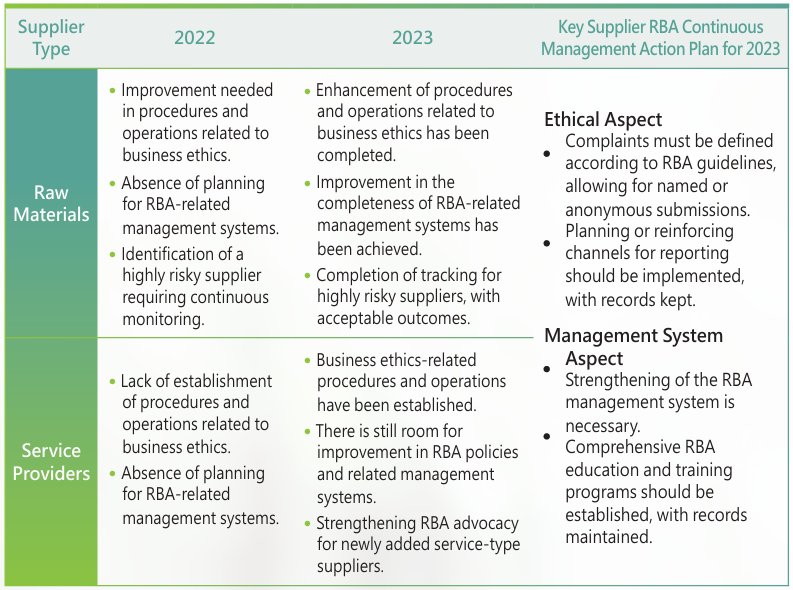
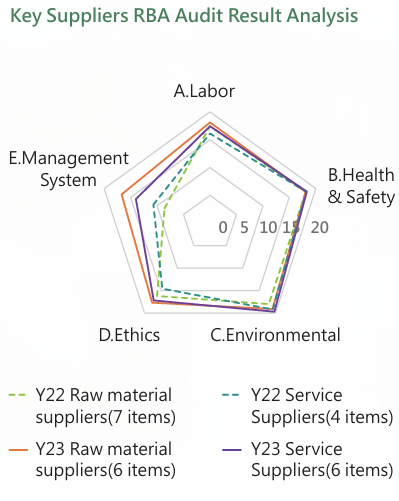
4.1.3 Local Procurement and Green Procurement
To enhance production efficiency, reduce carbon emissions from transportation, and contribute to the sustainable development of local industries, our company continues to promote local procurement. VisEra's main operational production site is located in Taiwan. The local procurement ratios for raw materials and components over the past five years are as follows.
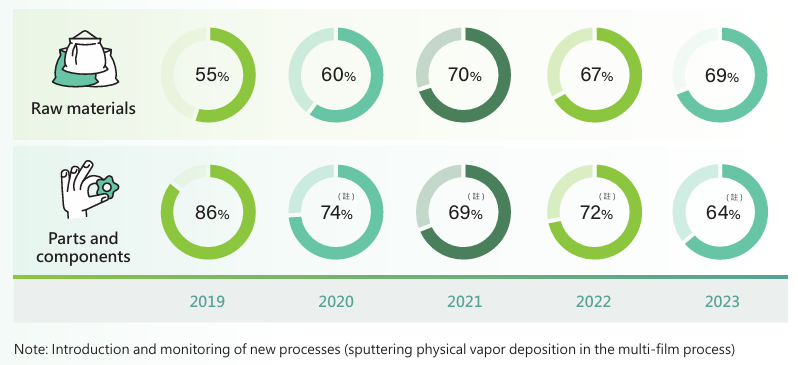
In addition, VisEra actively promotes a green procurement policy, encouraging procurement of products that meet various domestic environmental and green certifications, as well as products with internationally recognized environmental certifications or those covered by mutual recognition agreements with Taiwan. These certifications include Energy Star, FSC, and PEFC for sustainable forestry. Since 2019, the company has been recognized annually by the Hsinchu City Government for outstanding performance in green procurement evaluations. Furthermore, in 2023, VisEra received the Environmental Protection Administration's award for excellence in the evaluation of green procurement for private enterprises and organizations.
4.1.4 Management of Conflict Minerals
VisEra is committed to being a responsible link in the supply chain, ensuring social and environmental responsibility, and pledges not to use minerals extracted from areas of armed conflict, forced labor, or abusive working conditions. We require all relevant suppliers to comply with the prohibition of "conflict minerals" and disclose information about their smelters to pass new material certification and engage in transactions. In cases where information disclosure is incomplete or materials originate from non-compliant smelters, VisEra continuously urges suppliers to improve and explores alternative solutions.
VisEra mandates suppliers to sign a "Compliance Statement for the Code of Professional Ethics and Supplier Code of Conduct" and conducts an annual Conflict Minerals Questionnaire survey of direct material suppliers and subcontractors. We demand that materials provided by direct material suppliers and subcontractors meet corporate social responsibility standards, including current legal requirements for gold (Au), tantalum (Ta), tungsten (W), tin (Sn), cobalt (Co), and mica, or any metals in the future considered "conflict minerals" under the law. Suppliers must investigate the sources and disclose them to avoid materials from conflict areas or confirm that they originate from smelters certified through the Responsible Minerals Assurance Process (RMAP) provided by the Responsible Minerals Initiative (RMI). If incomplete disclosure or materials from non-compliant smelters are discovered, VisEra will continue to request improvements from suppliers.
VisEra updates the "RMI Conflict Minerals Reporting Template" at least once a year to avoid the risks of overlooking new minerals and new regulatory requirements, using the latest version of the questionnaire in 2023. We conduct audits of procurement targets or smelters as needed to ensure that the supplied raw materials meet social responsibility standards. In 2023, we used the Conflict Minerals Reporting Template (CMRT) and Extended Minerals Reporting Template (EMRT) questionnaires to survey 15 direct material suppliers and subcontractors, achieving a questionnaire response rate of 100%. Among them, 8 smelters identified were all certified under the Responsible Minerals Assurance Process (RMAP), with a non-compliance rate of 0%. As none of the direct material suppliers or subcontractors used conflict minerals, there were no restrictions or difficulties encountered, and no subsequent improvement measures were required. Currently, there have been no significant changes or upward trends in raw material supplier prices due to conflict minerals management.
